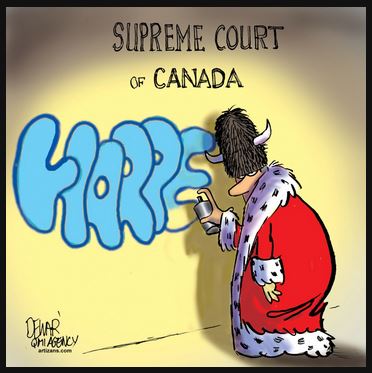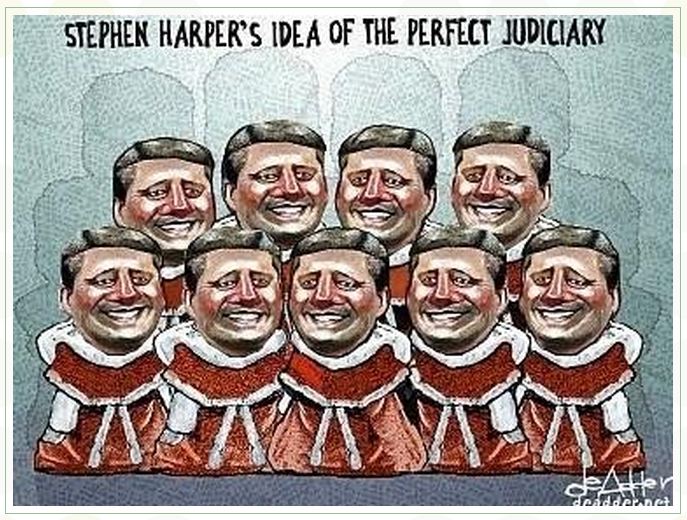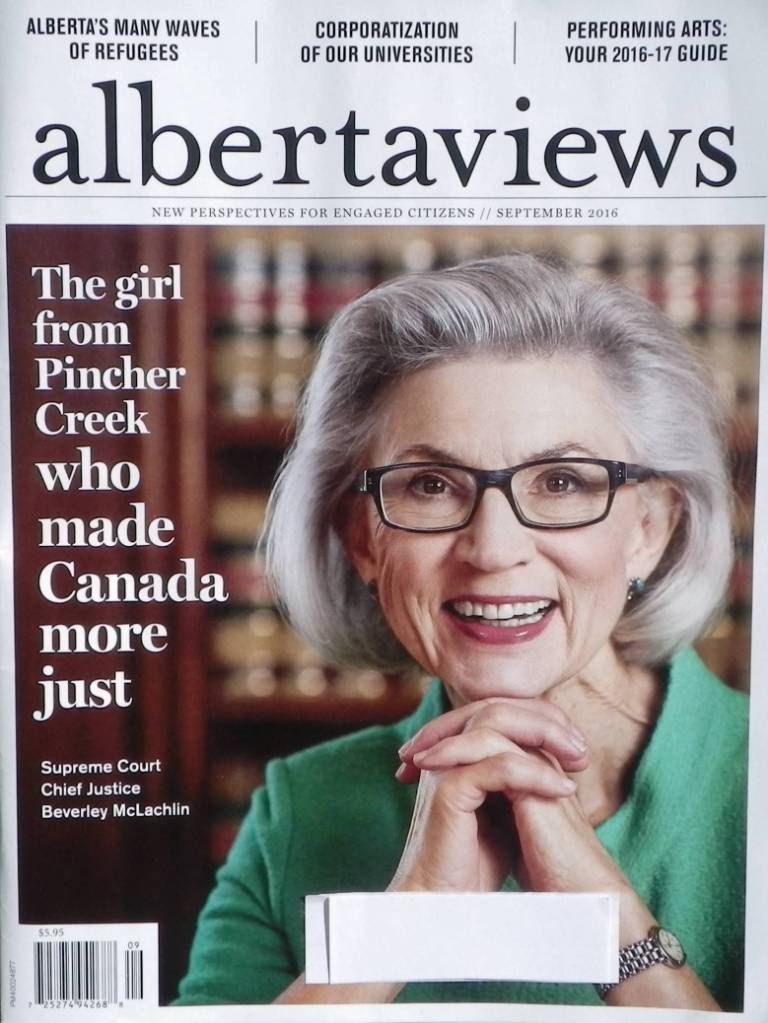Canada’s Top Judge Supreme Court Chief Justice Beverly McLachlin’s remarkable service by Katherine Ashenburg, September 2016, Alberta Views
Print copies available by subscription, in stores and libraries.
The wind makes you resilient. You learn to stand up against adversity
Brian Mulroney appointed her to the Supreme Court of Canada in 1989, only the third woman to sit on the Supreme Court. Jean Chrétien chose her as Chief Justice in 2000. Her rise was so swift that an officer of the Law Society of BC joked that she’d progressed through the court system “faster than it takes most litigation.” …


In retrospect it looks like a tempest in a teapot, a frustrated prime minister bursting into a hissy fit that says much more about him than about the chief justice. …
McLachlin herself shrinks from thinking about her proudest achievement…but admits that her speeches and work bringing like-minded people together to promote access is high on the list. “It’s a passion for me that every person of whatever background or means should have access to the Canadian judicial system. It shouldn’t be for the wealthy of the elite or the government, it should be there for everyone.”
But the mills of the judicial system grind slowly. McLachlin acknowledges more work is needed: “‘Achievement’ puts it too strongly; it’s a work in progress. But if I’ve been able to make (accessibility) more prominent or to serve as a catalyst, then I’m gratified.” …
[Refer also to:
Ottawa must fill court vacancies to ensure timely justice
2016 08 16: Empty benches delaying justice for Canadians [What better way for governments to make sure ordinary Canadians do not have access to justice than by cutting funding and making sure empty benches stay empty?]
2016 08 11: Chief Justice Beverley McLachlin: key quotes
Canada’s top justice did her best to stay far away from politics during her visit to Canadian Bar Association’s annual conference in Ottawa — but that’s not to say she kept all of her opinions to herself. A sampling:
ACCESS TO JUSTICE
“Access to justice in Canada remains a serious problem that imperils the public’s confidence in the justice system,” Chief Justice Beverley McLachlin said in her speech.
“Rules and procedures are still, sometimes, more complicated than they should be, causing unnecessary delays. Financial barriers continue to thwart access to justice.
The low level of funding for legal aid leads litigants to appear in courtrooms without the support of counsel, placing unfair burdens on courts, the litigants, the bar and, ultimately, the public purse.
“And finally, some may hold attitudes of mistrust or fear toward the justice system, refusing to engage with it or acknowledge its legitimacy.”
BILINGUALISM ON THE BENCH
“The court is committed, as a court, to functioning in both official languages,” said McLachlin, who would not comment specifically on the Liberal government’s decision to require all future nominees to the high court be functionally bilingual.
McLachlin said she was already bilingual when she joined the high court in 1989, having taken every French-language course available to her earlier in her judicial career, but still fell there was room for improvement.
“I still had a ways to go to be fully, I felt, comfortable asking questions and functioning at a very high level,” she said.
“I used the job to get even better, to try to become even better, because I believe that it’s important that we be able to do that.”
SEXUAL ASSAULT
McLachlin said there has been a lot of progress in the way the justice system handles sexual assault cases since she was first called to the bar more than 40 years ago.
“We still see the odd case of inappropriate behaviour and it’s dealt with as appropriate through the complaints process, but anecdotally I can tell you that as a young woman starting to practice in the early 70s, there was a lot more inappropriate conduct of this kind of case — a lot more sexual innuendo and that kind of thing — than there is now,” McLachlin said.
“I think this is a good news story, actually. During my lifetime, we’ve made a great deal of progress in sensitizing all levels of society — prosecutors, judges, included — to the inappropriateness and to recognize sexual biases and sexual attitudes towards women that they might not otherwise have recognized,” she said.
“It’s not a rising problem. It’s a diminishing problem.”
THE CANADIAN JUDICIAL COUNCIL
McLachlin called on the federal government to restore funding to the Canadian Judicial Council she chairs, which she said has been struggling to fulfil its statutory mandate since losing a major part of its funding in 2014. [Steve Harper was PM at that time]
The Canadian Judicial Council asked the federal government for an additional $1.3 million this year, including $700,000 to get back to activities that were abandoned or delayed due to cuts.
“I’m hoping that this will be restored in the near future, because quite frankly it’s been difficult to understand why some of these projects that I believe all MPs and … people in government would support, why we haven’t been given the money to do it,” she said.
That includes having to shelve plans to update and revise ethical principles for judges, she added.
“Maybe we can find better ways of communicating with Treasury Board or whoever it is and making sure that we get the money we need to carry out our statutory mandate.” [Emphasis added]
What makes something “Kafkaesque”?
Even in The Trial, which seems to focus directly on bureaucracy, the vague laws and bewildering procedures point to something far more sinister. The terrible momentum of the legal system proves unstoppable, even by supposedly powerful officials.
This is a system that doesn’t serve justice, but whose sole function is to perpetuate itself.
What political theorist Hannah Arendt, writing years after Kafka’s death, would call, “Tyranny without a tyrant.”
***
“We have wonderful justice for corporations and for the wealthy. But the middle class and the poor may not be able to access our justice system.”
– Chief Justice Beverley McLachlin, University of Toronto conference, 2011
***
And then there’s the oil and gas industry’s access to justice

